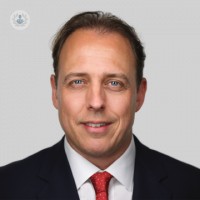Dysphagia: what is it, and how can it be managed?
Written by:In one of our latest articles here, revered London-based consultant ENT surgeon and laryngologist, Mr Nick Hamilton, explains in expert detail what dysphagia is, and reveals whether or not it is considered to be a serious condition.

What is dysphagia? Are there different types?
Dysphagia is the medical term for swallowing problems. It is derived from the Greek word “dys” meaning bad and “phago” meaning eat. Dysphagia covers all aspects of swallowing difficulty.
It can be separated into high dysphagia, which refers to difficulties in swallowing due to the throat and upper part of the food pipe, or low dysphagia, which refers to difficulties in swallowing due to problems with the middle or lower end of the food pipe.
Is it a serious condition? Can it affect life expectancy?
The seriousness or dysphagia can vary. Sometimes, it can be very mild and will have no impact on life expectancy. In rarer circumstances, it can be due to serious illness which could impact life expectancy.
What are the symptoms?
The symptoms of dysphagia include abnormal sensations when swallowing, difficulty swallowing food or fluid, and food escaping into the airway after swallowing, resulting in coughing.
How is dysphagia treated?
The treatment of dysphagia depends on the underlying cause, and therefore, the first step in treating dysphagia involves investigating the underlying cause. This can be done with endoscopies or X-rays. Treatments can range from swallowing physiotherapy, medical treatments for conditions such as acid reflux, or occasionally, and if required, surgery.
How can people manage dysphagia? Is there a specific diet for it?
If a patient has concerns over dysphagia, it is important that they seek medical attention so the underlying cause can be identified. If the underlying cause is believed to be due to acid reflux from the stomach, controlling factors in the diet that promote acid reflux can be all that is necessary.
Dysphagia related to problems with muscle coordination can also be effectively managed by adjusting the type of food one eats, although this should be supervised by a medical professional.
Mr Nick Hamilton is a highly qualified ENT specialist who can detect the underlying cause of dysphagia. Consult with him today by visiting his Top Doctors profile.


